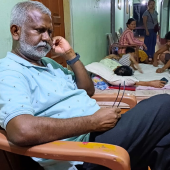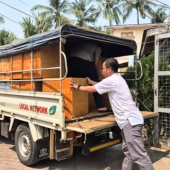Burmese still hospitable, generous despite unbearable challenges

Notwithstanding the pandemic and political crisis, the Burmese people show hospitality honesty and offer charitable donations to alleviate their suffering neighbours.
People’s income is dwindling as unemployment increases with rick taking up government jobs, banks shutting down business slowing.
Myanmar people are protesting in what is now being called as Civil Disobedience Movement (CDM).
In the face of challenges, the tradition of Myanmar people triumphs. These traditions include kind behaviors and honest actions.
Charitable activities have erupted alongside CDM.
A street vendor offers for free, even though they have survived on daily income. They provide free food and water bottles to people irrespective of religion.
"Take if you need, donate if you have” has become a new slogan.
Even restaurants sell foods at the lowest prices to help people in need. There are donation stations, even Mobile top-ups, an organization from each religion donating to CDM employees without discrimination.

Paolo Tempongko Magallanes, a Filipino man living in Myanmar, wrote a commentary post on his Facebook page that he is amazed by seeing the honesty of Myanmar people and warmly welcoming people who fled with all sorts of problems and waiting on the streets to return the things (from iPhones to slippers) people had accidentally left so they can come to take those back.
“When there were terrorist incidents, these people collected and kept the things left on the streets not to resell them to earn money but for the owners to get those things back from them. They are spectacular people,” Magallanes Facebook post says.
Magallanes says, "I am proud of being in this country. I'm grateful for working with the Myanmar people. Living here and being with people who treat me as their family makes me very happy. I had a thought about how much the world needs to know how beautiful Myanmar people are."
Father Mercian Thet Kyaw, the parish priest of Epiphany's Church in Myanmar, Yangon Archdiocese, began what is now known in the local language as the "500 Kyats Charity Meals" program.
The meals help the poor with an affordable price of 500 kyats (USD 0.30).
The priest was inspired by others who started selling low-price meals during the covid pandemic and amid political crises.
"The intention of starting that is to help the people who are in need. If there are other people doing charity work, why shouldn't we? Also, to do it together with the church. There could be daily donators as well as monthly donators,” the priest says.
The priest encourages people to cultivate a desire to donate or help while receiving the donations or checking the donation event out. Since we work with the church, we need to bring Christs' words into reality.
“When you are in Heaven, God doesn't ask you if you were good or bad. He'll only ask you if you gave water to people when they were thirsty and feed people when hungry. When we work on something, we don't need to start very big, and we should start by doing small things that we can. Like with something we can afford in somewhere we are. There are 20 to 40 people who are preparing food. We should all follow Christs' order which is to feed the hungry people," said Father Marcian.
The priest says, “thinking for other people while everyone faces the same problems is not easy to do. I wish there would be more people in society who have very good intentions and beautiful hearts.”
With inputs from Sister Lucia Thandar Aung, SJA

Radio Veritas Asia (RVA), a media platform of the Catholic Church, aims to share Christ. RVA started in 1969 as a continental Catholic radio station to serve Asian countries in their respective local language, thus earning the tag “the Voice of Asian Christianity.” Responding to the emerging context, RVA embraced media platforms to connect with the global Asian audience via its 21 language websites and various social media platforms.














